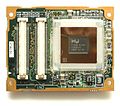Notebook processor
A notebook processor is a CPU optimized for notebook computers.
One of the main characteristics differentiating notebook processors from other CPUs is low-power consumption.
The notebook processor is becoming an increasingly important market segment in the semiconductor industry. Notebook computers are an increasingly popular format of the broader category of mobile computers. The objective of a notebook computer is to provide the performance and functionality of a desktop computer in a portable size and weight.
Cell phones and PDAs utilize microcontrollers that use less power than notebook processors.
While it is possible to use desktop processors in laptops, this practice is generally not recommended, as desktop processors heat faster than notebook processors and drain batteries faster.
Currently[when?], the fastest notebook processor is the 3rd[clarification needed] Generation Intel core i7 4930MX), a 3 GHz Quad-core processor.[1] The new core i7 line has the "Intel Turbo Boost" mode that can boost its clockspeed over the factory default The first "quad-core" notebook processor (code named "Penryn QC") was released by Intel in Q3 2008.[2]
Models
Current
- ARM architecture (used in Chromebooks or Windows 10 laptops)
- x86
- AMD: A-Series APU, Ryzen Mobile
- Intel: Pentium M, Core Duo, Core 2 Duo and the budget Celeron M and quad-core
Former
- PowerPC
- Freescale Semiconductor makes the PowerPC G4 processors that were used in the pre-Intel Apple Computer notebooks.
- x86
Image gallery
-
Intel Mobile Pentium MMX 300 MHz
-
Rare Fujitsu Pentium 100 MHz for Notebooks
-
Rare Fujitsu Pentium 150 MHz for Notebooks



